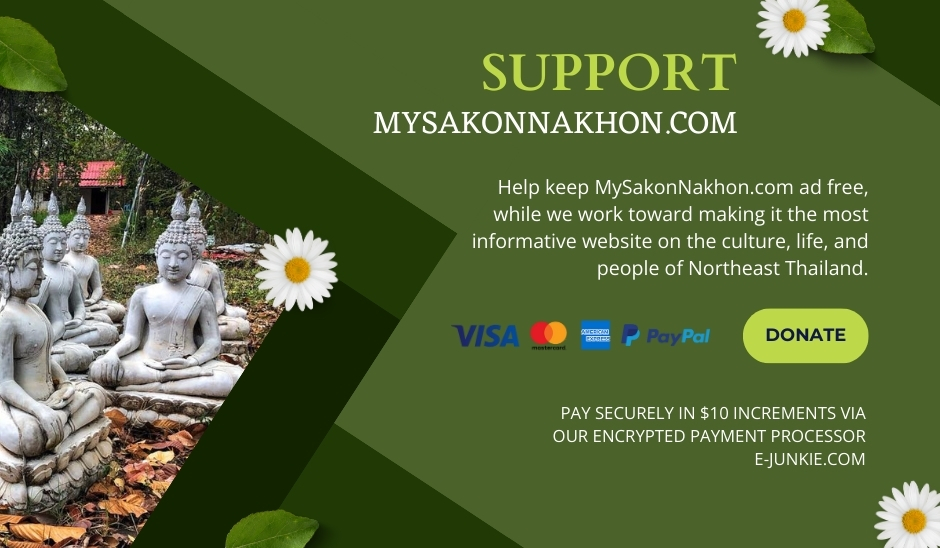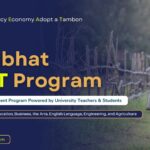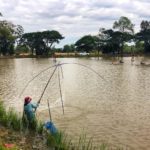
A Defense of Thailand’s Sufficiency Economy Philosophy
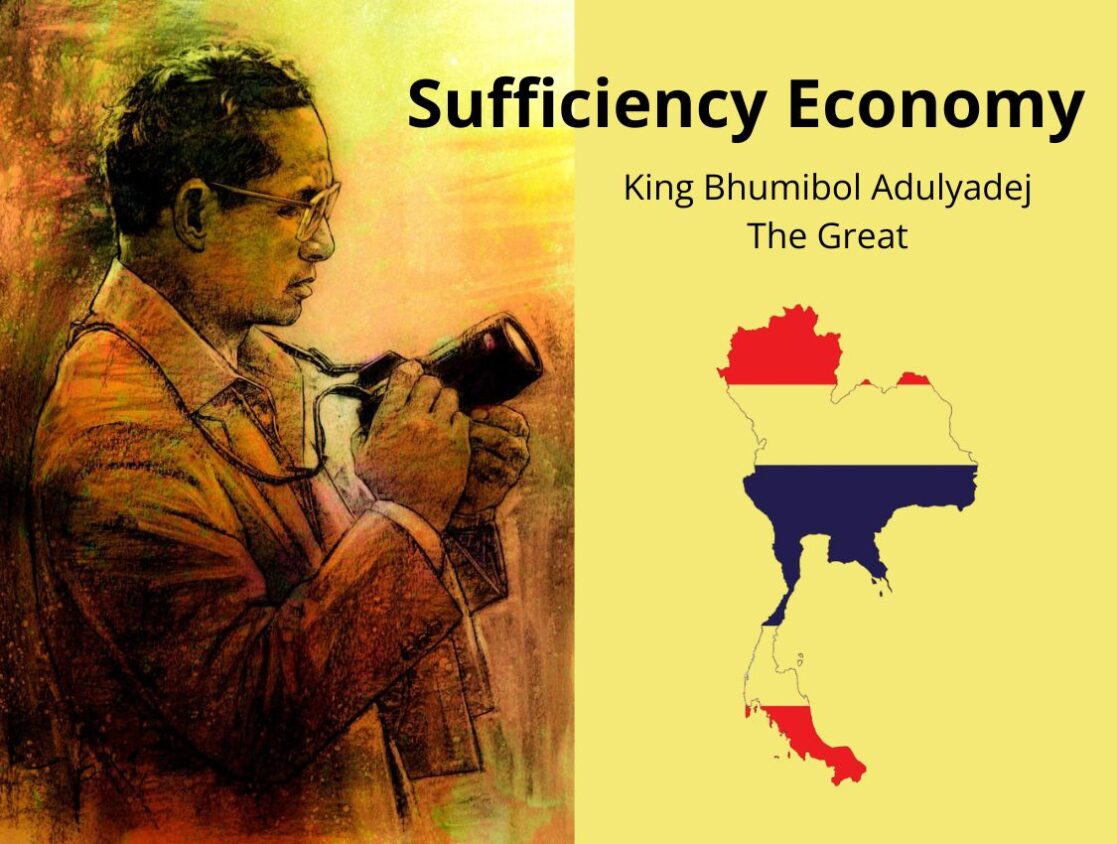
King Bhumibol the Great of Thailand had many accomplishments during his 70 year reign, but his greatest legacy might be his promotion of a Sufficiency Economy, which is a socio-economic philosophy that emphasizes moderation, self-sufficiency, and resilience to external shocks.
His Majesty first introduced the concept of Sufficiency Economy in the late 1970s and early 1980s, within the context of rural development projects in Thailand, which he frequently spearheaded.
The concept gained broader recognition and prominence in the late 1990s and early 2000s, particularly following the Asian Financial Crisis of 1997. During this time, King Bhumibol Adulyadej advocated for the principles of Sufficiency Economy as a response to economic volatility, instability, and over-reliance on the international community, stating:
“Being a [Asian] tiger is not important. The important thing is for us to have a sufficient economy. A sufficient economy means to have enough to support ourselves … we have to take a careful step backward … each village or district must be relatively self-sufficient.”
(“การเป็นเสือไม่ใช่สิ่งสำคัญ สิ่งที่สำคัญคือการที่พวกเรามีเศรษฐกิจที่พอเพียง เศรษฐกิจพอเพียง หมายถึง การที่เรามีเพียงพอ เพื่อที่จะช่วยเหลือตัวเองได้ เราต้องก้าวย้อนไปอย่างระมัดระวัง แต่ละหมู่บ้านและตำบลต้องพึ่งพาตนเองได้ในระดับหนึ่ง”)
HM the King ultimately received the Human Development Lifetime Achievement Award from the United Nations Development Programme (UNDP) in 2006, thanks to his promotion of the Sufficiency Economy philosophy and his related rural development efforts.
One of the key strengths of the Sufficiency Economy philosophy lies in its emphasis on holistic development rather than relentless pursuit of growth at all costs. Unlike traditional economic theories, which often prioritize GDP growth and consumption as measures of success, a Sufficiency Economy paradigm places importance on balanced development, focusing on the well-being of individuals and communities alongside economic prosperity.
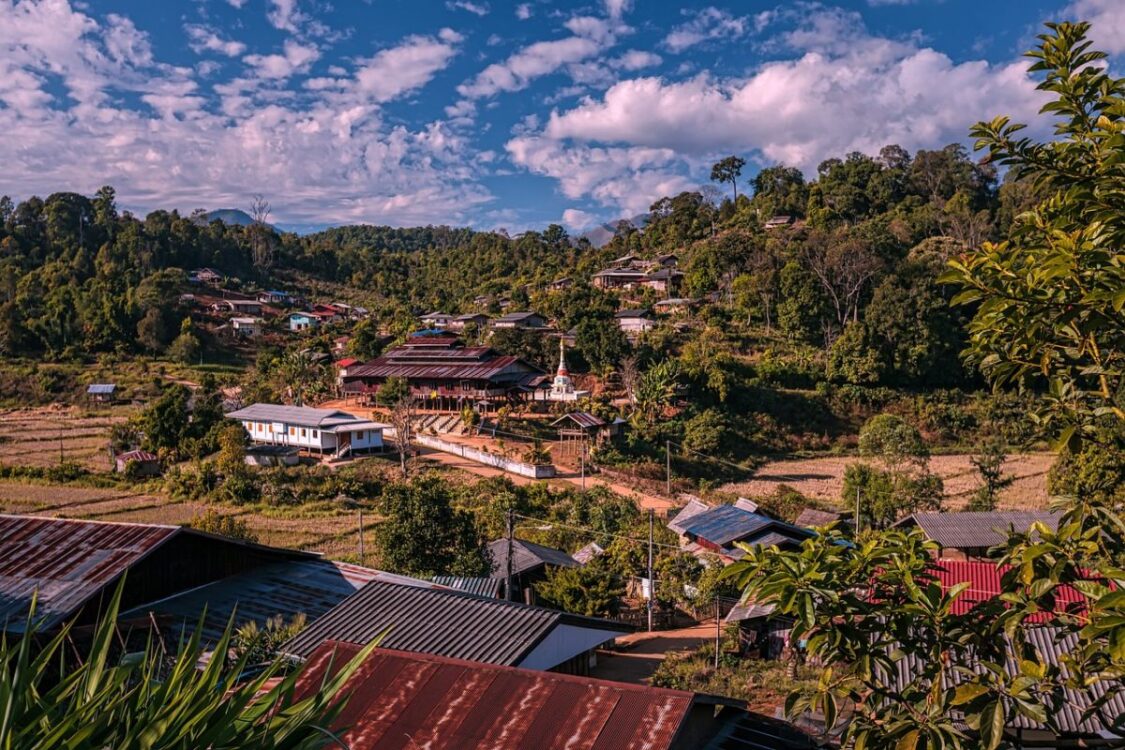
Sufficiency Economy Principles
When presented to Thai audiences, the Sufficiency Economy (เศรษฐกิจพอเพียง) philosophy is usually presented as 3 intersecting circles, representing modesty (พอประมาณ), reasonableness (มีเหตุผล), and resilience (มีภูมิคุ้มกัน), hovering above two pillars: knowledge and virtue. Success for the individual and community is said to depend on carefulness, honesty, diligence, patience, wisdom, and sharing (รอบคอบ ซื่อสัตย์สุจริต ขยันอดทน สติปัญญา แบ่งปัน).
Our friend Dr. Sawai Boonma, a former economist at the World Bank, has written eloquently on this topic in his book on the Sufficiency Economy (which is written in Thai and can be downloaded here).
In my defense of the Sufficiency Economy paradigm, I’ve identified six key principles that can be derived from King Bhumibol’s expressed philosophy and his lifelong work in rural development, principles which should continue to guide the policies of the Thai government and rural development projects in Thailand.
1. Resilience and Stability: A Sufficiency Economy advocates for building resilience at the individual, community, and national level. By promoting self-sufficiency and moderation, it reduces vulnerability to external shocks, such as economic crises, natural disasters, or fluctuations in global markets. This resilience contributes to greater stability in the face of uncertainties.
2. Sustainability and Efficiency: Unlike many traditional economic theories that prioritize short-term gains and resource exploitation, a Sufficiency Economy paradigm emphasizes sustainable practices. It encourages the efficient use of resources, environmental conservation, and the preservation of cultural heritage, ensuring long-term viability for future generations.
3. Social Harmony and Equity: The emphasis on community well-being and moderation fosters social cohesion and reduces inequality. Rather than perpetuating disparities between the wealthy and the marginalized, a Sufficiency Economy promotes inclusive development, where the benefits of economic growth are shared more equitably among all members of society.
4. Adaptability and Flexibility: A Sufficiency Economy is adaptable to diverse cultural, social, and economic contexts. Its principles can be applied at various scales, from individual households to national policies, allowing for flexibility in implementation. This adaptability makes it suitable for addressing the unique challenges faced by different communities and countries.
5. Long-Term Orientation: By prioritizing sustainable development over short-term gains, a Sufficiency Economy encourages decision-making that considers the long-term consequences of actions. This forward-looking approach helps prevent the accumulation of debt, environmental degradation, and social unrest that can result from shortsighted policies.
6. Ethical Framework: Unlike some economic theories that prioritize profit maximization without regard for ethical considerations, a Sufficiency Economy incorporates moral and ethical principles into its framework. It emphasizes integrity, honesty, and responsibility in economic activities, fostering a culture of ethical behavior and trust within society.
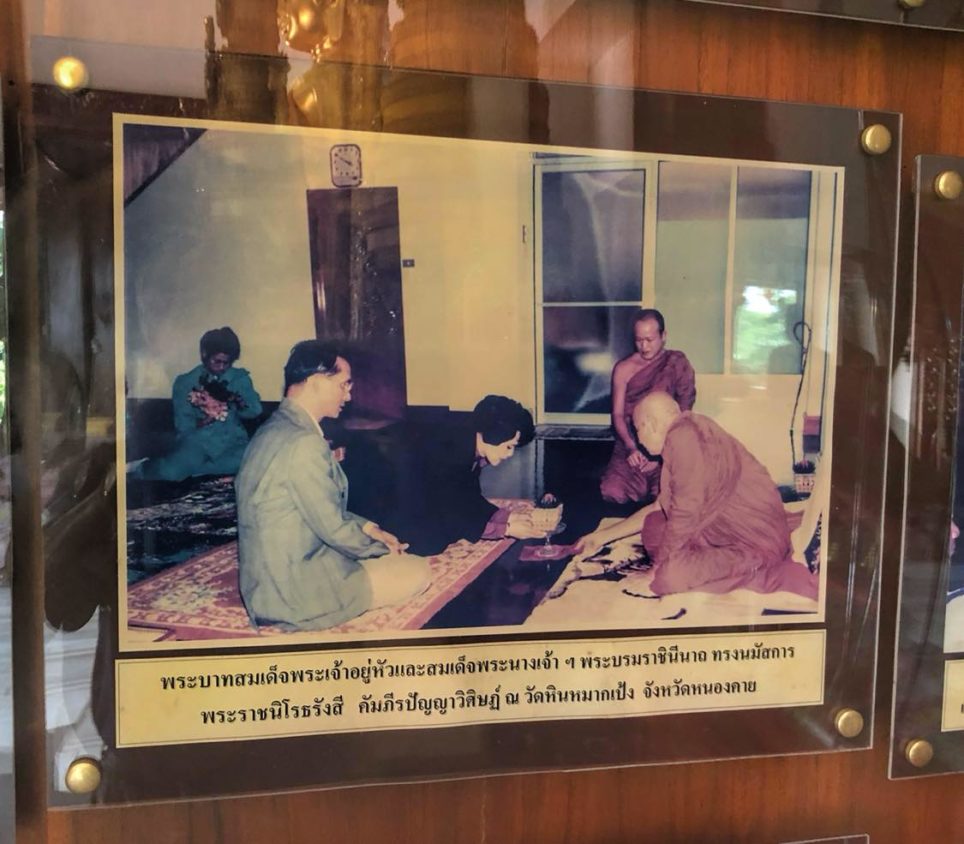
How Buddhism Relates to the Sufficiency Economy Philosophy
These 6 key aspects of Thailand’s Sufficiency Economy philosophy align closely with the deeply felt Buddhist beliefs of King Bhumibol the Great, who had close relationships with several of Thailand’s most revered monks, including Ajarn Fun Acharo of Sakon Nakhon, who he would strive to see every time he was in the Northeast of Thailand.
Buddhism, for example, emphasizes the Middle Way, advocating for moderation and balance in all aspects of life. Similarly, a Sufficiency Economy promotes moderation in consumption, investment, and behavior, encouraging individuals and societies to avoid extremes and find a balanced approach to development.
Buddhism also teaches the interconnectedness of all beings and the importance of recognizing our interdependence with the environment and society. A Sufficiency Economy likewise acknowledges the interconnectedness of economic, social, and environmental systems, emphasizing the need for holistic approaches to development that consider the well-being of all stakeholders.
In addition, Buddhism teaches that true happiness and well-being come from within and are not dependent on external wealth or material possessions. A Sufficiency Economy also promotes the cultivation of inner wealth, emphasizing self-sufficiency, self-reliance, and contentment with simple living. By encouraging individuals to focus on inner fulfillment rather than external wealth, Sufficiency Economy reflects Buddhist teachings on the nature of happiness and well-being.
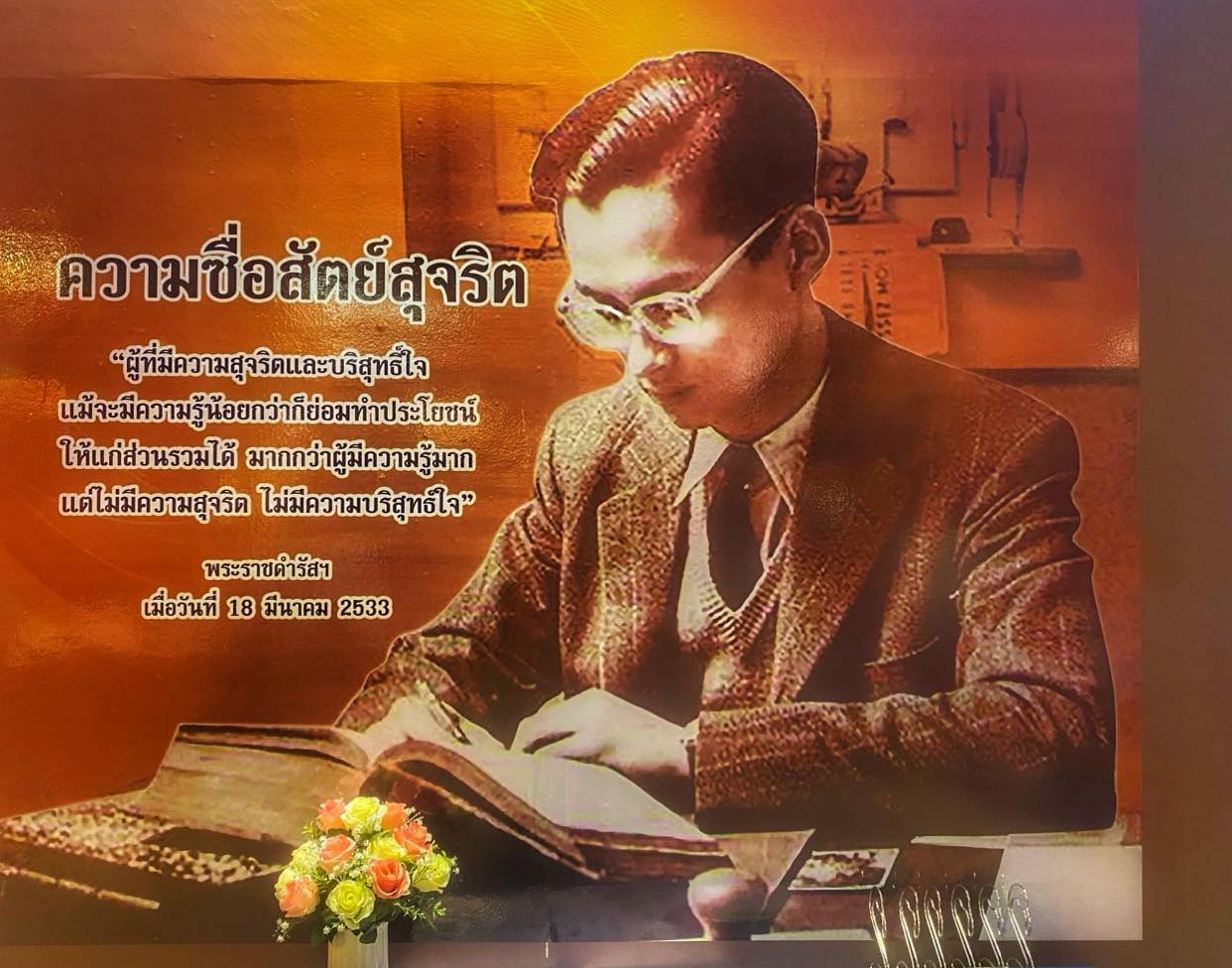
Criticisms of the Sufficiency Economy Philosophy
One common criticism of Thailand’s Sufficiency Economy philosophy is that by emphasizing self-reliance and moderation, it may inadvertently reinforce existing inequalities between the “haves and have nots,” particularly if resources and opportunities are not distributed equitably within society.
However, a Sufficiency Economy paradigm prioritizes social equity and community well-being as integral components of development. By empowering marginalized groups, promoting equitable access to resources, and fostering community participation, Sufficiency Economy programs in Thailand have sought to address underlying structural inequalities and promote inclusive growth.
The Kingdom continues to work toward developing targeted interventions and better social safety nets, so that the benefits of development are shared more equitably among all members of society. There is, of course, still much work to do on this front, but small positive steps continue to be taken.
Another criticism of the Sufficiency Economy philosophy is that it’s too vague and abstract, and lacks clear guidelines for implementation, making it difficult to translate into concrete policies or actions.
While the Sufficiency philosophy may lack prescriptive guidelines, its principles offer a flexible framework that can be adapted to diverse contexts. By focusing on principles such as moderation, self-reliance, and resilience, policymakers and practitioners can tailor interventions to address specific challenges while maintaining overarching sustainability goals.
To demonstrate this, let’s take each of the 6 key aspects of a Sufficiency Economy that I mentioned earlier (Resilience & Stability, Sustainability, Social Harmony & Equity, Adaptability & Flexibility, Long Term Orientation, and Ethical Framework), and describe how Thailand has translated those principles into concrete action.

How Thailand Has Used Sufficiency Economy Ideas
1. Resilience & Stability in Action
One example that illustrates the resiliency and stability inherent in a Sufficiency Economy is Thailand’s response to the 1997 Asian Financial Crisis.
During the Asian Financial Crisis, Thailand was one of the countries hardest hit by the economic turmoil. The crisis, triggered by currency devaluations and financial speculation, led to a sharp economic contraction, soaring unemployment, and widespread social unrest in many affected countries across the region.
Thailand, under the guidance of King Bhumibol Adulyadej, implemented policies aligned with the principles of Sufficiency Economy to mitigate the impacts of the crisis and promote recovery.
Prior to the crisis, Thailand had pursued rapid economic growth fueled by heavy borrowing and speculation, leaving it vulnerable to external shocks. However, the principles of Sufficiency Economy encouraged a shift towards greater self-reliance and diversification of economic activities. This allowed Thailand to reduce its reliance on volatile global markets and focus on developing resilient domestic industries.
During the crisis, communities in Thailand rallied together to support one another through mutual assistance networks, cooperatives, and community-based initiatives. This solidarity helped buffer the impact of the crisis on vulnerable groups and fostered resilience at the grassroots level.
Rather than resorting to short-term fixes or knee-jerk reactions, Thailand adopted measures aimed at promoting sustainable development and addressing underlying structural weaknesses in the economy. This long-term approach laid the foundation for a more resilient and stable economic recovery in the years following the crisis.
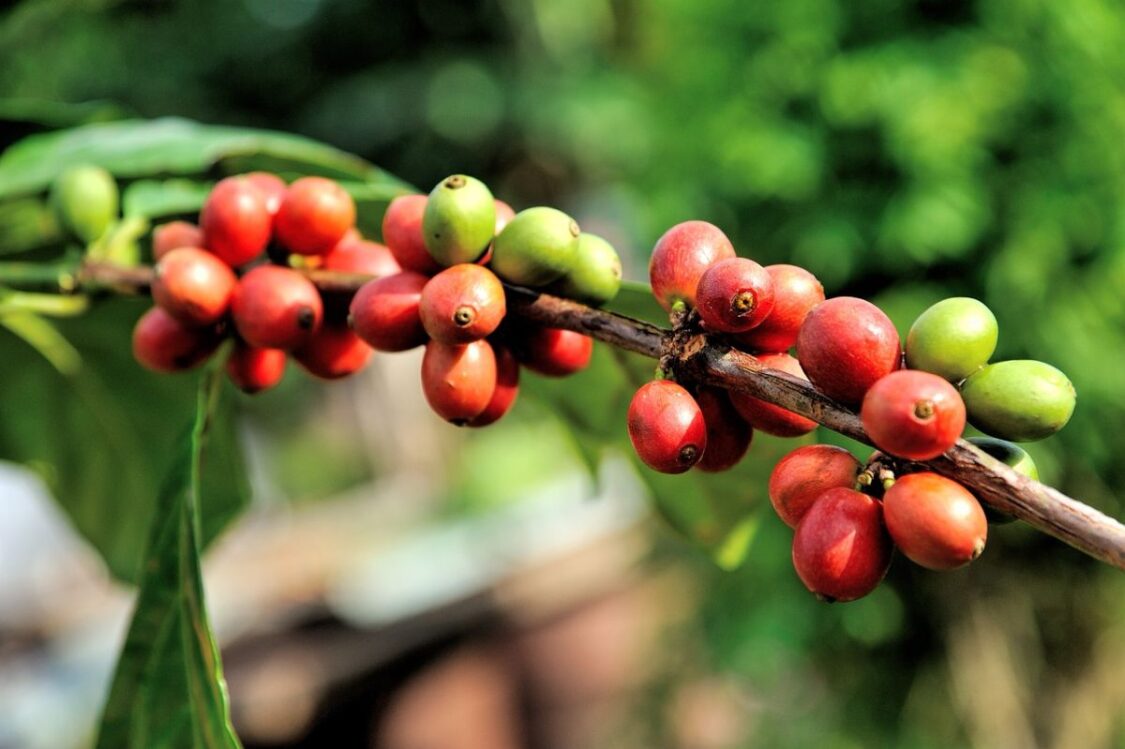
2. Sustainability in Action
A notable initiative that showcases the sustainability principles of a Sufficiency Economy is the Royal Project Foundation in Thailand.
The Royal Project Foundation (มูลนิธิโครงการหลวง) was initiated by King Bhumibol Adulyadej in 1969 with the aim of promoting sustainable agricultural practices, reducing opium cultivation, and improving the livelihoods of hill tribe communities in northern Thailand.
The project embodies the principles of a Sufficiency Economy by emphasizing sustainable development, environmental conservation, and community empowerment. For example, one of the key objectives of the Royal Project Foundation was to provide alternative livelihoods to hill tribe communities traditionally engaged in opium cultivation.
Instead of simply eradicating opium crops, which could exacerbate poverty and social unrest, the project focused on diversifying agricultural activities. It introduced high-value crops such as temperate fruits, vegetables, and flowers that were well-suited to the region’s climate and soil conditions. This diversification not only reduced dependence on opium cultivation but also enhanced the resilience of communities by creating multiple income streams.
The Royal Project Foundation prioritizes environmental sustainability by promoting organic farming practices and biodiversity conservation. Traditional slash-and-burn agriculture, prevalent among hill tribe communities, had led to deforestation, soil erosion, and loss of biodiversity. But through education and training programs, the foundation encouraged Thai farmers to adopt sustainable farming methods that preserve soil fertility, protect watersheds, and conserve natural habitats.
By integrating environmental considerations into agricultural practices, the project continues to contribute to the long-term health of ecosystems and supports sustainable livelihoods. Rather than imposing top-down solutions, the Royal Project Foundation engages local communities in decision-making processes, encourages ownership of initiatives, and fosters collaboration among stakeholders.
Communities are actively involved in identifying their needs, designing interventions, and implementing projects tailored to their unique circumstances. This bottom-up approach not only ensures the relevance and sustainability of interventions but also strengthens social cohesion and resilience within Thai communities.
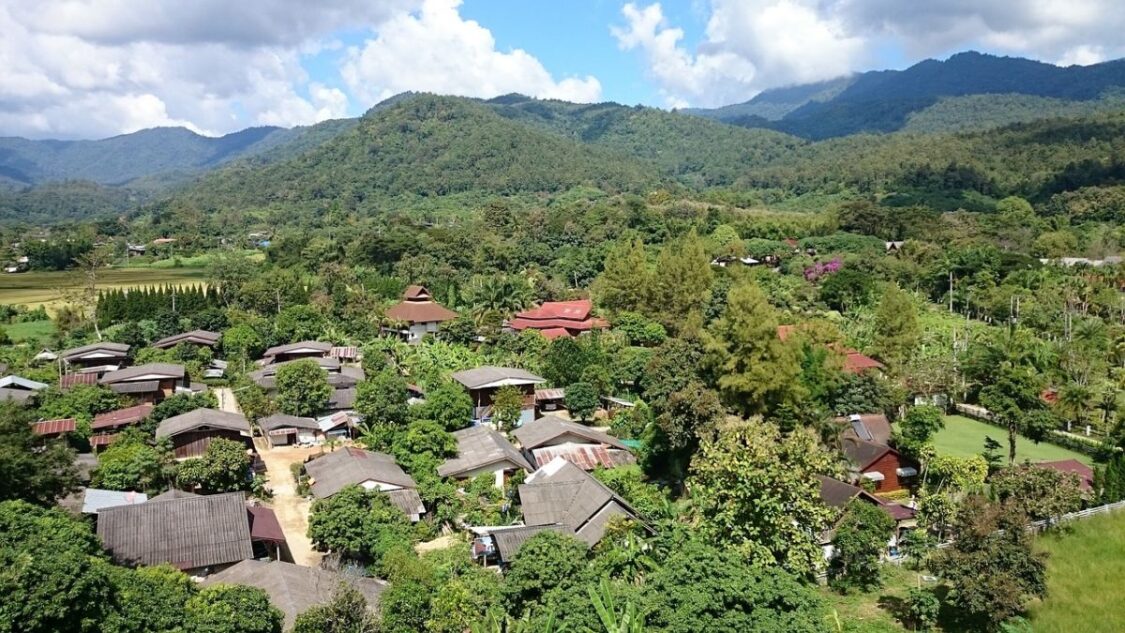
3. Social Harmony & Equity in Action
One project from the Thai government that highlights the promotion of social harmony and equity under the Sufficiency Economy philosophy is the “Sufficiency Economy Villages” (หมู่บ้านเศรษฐกิจพอเพียง) program.
Sufficiency Economy Villages (SEVs) are community-led development projects that embody the principles of a Sufficiency Economy, aiming to improve the well-being of rural communities in Thailand while fostering social cohesion and equity.
These villages prioritize community participation and empowerment in decision-making processes. Local residents are actively involved in identifying their needs, setting development priorities, and implementing projects that align with the principles of Sufficiency Economy. This participatory approach ensures that development initiatives are culturally sensitive, socially inclusive, and responsive to the unique circumstances of each community.
One of the primary objectives of SEVs is to improve livelihoods and reduce poverty among rural Thai populations. The initiative promotes income-generating activities that are sustainable, environmentally friendly, and socially inclusive.
For example, Sufficiency Economy Villages may support the development of community-based enterprises such as organic farming cooperatives, handicraft production groups, ecotourism ventures, or renewable energy projects. By creating opportunities for entrepreneurship and diversifying sources of income, SEVs help to uplift marginalized groups and narrow the gap between rural and urban areas.
Sufficiency Economy Villages also place importance on preserving Thailand’s cultural heritage and traditional knowledge as integral components of sustainable development. Communities are encouraged to draw upon their cultural roots, indigenous practices, and local wisdom in shaping development strategies. By valuing and revitalizing cultural traditions, SEVs contribute to the preservation of cultural identity, social cohesion, and intergenerational continuity within rural Thai communities.
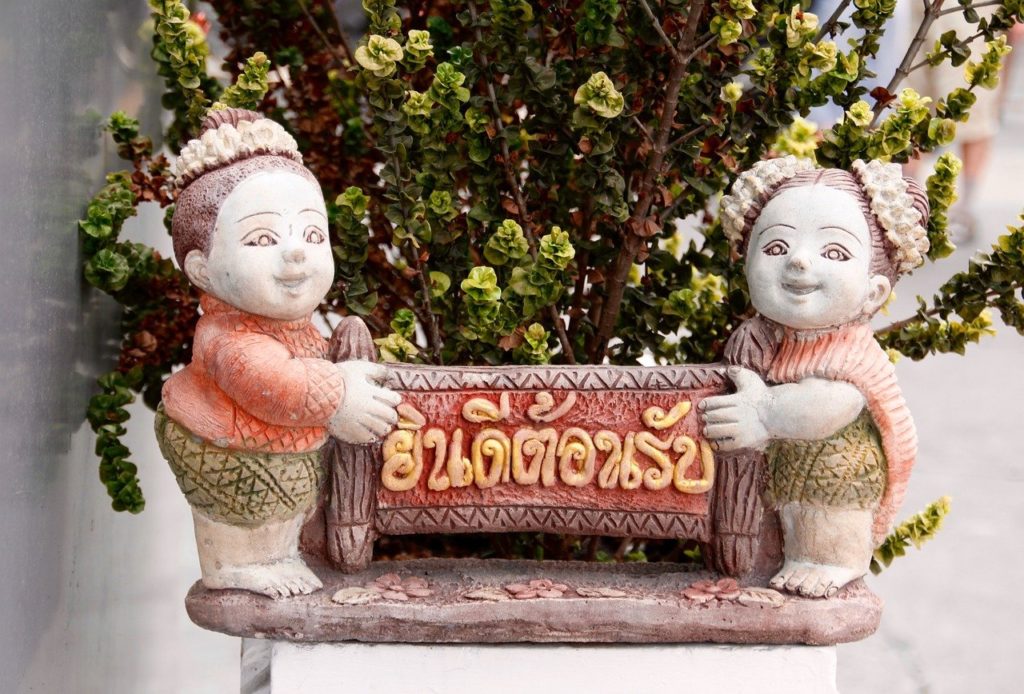
4. Adaptability & Flexibility in Action
A concrete example that illustrates the adaptability and flexibility in a Sufficiency Economy is the application of community-based tourism initiatives in rural Thailand.
In recent years, Thailand has seen a growing interest in community-based tourism as a means to promote sustainable development, empower local communities, and diversify the tourism sector beyond traditional destinations like Bangkok, Chiang Mai, and Phuket. Sufficiency Economy principles have played a crucial role in guiding the development and implementation of these initiatives, allowing Thai communities to adapt to changing tourism trends and market demands while preserving their cultural and environmental heritage.
Over the past decade, there has been a significant increase in community-based tourism initiatives in Thailand, where local communities are encouraged to showcase their unique cultural traditions, craftsmanship, and way of life to visitors. By highlighting their cultural identity and heritage, communities can differentiate themselves in the tourism market and attract travelers seeking genuine and immersive experiences.
In community-based tourism initiatives, local residents are actively involved in planning, managing, and benefiting from tourism activities. Community-run homestays, cultural tours, and handicraft workshops empower residents to take ownership of tourism development, create economic opportunities, and retain control over their resources and livelihoods.
By empowering communities as stakeholders in Thailand’s tourism industry, a Sufficiency Economy fosters a sense of ownership, pride, and responsibility among residents.
Tourism stakeholders also are made aware of the flexibility and adaptation required to meet changing market trends and visitor preferences. Communities are encouraged to continuously assess and adjust their offerings based on feedback from travelers, market research, and changing demographics.
This adaptability allows Thai communities to tailor their tourism products and experiences to meet the evolving needs and expectations of visitors, ensuring their competitiveness and relevance in Thailand’s tourism industry.
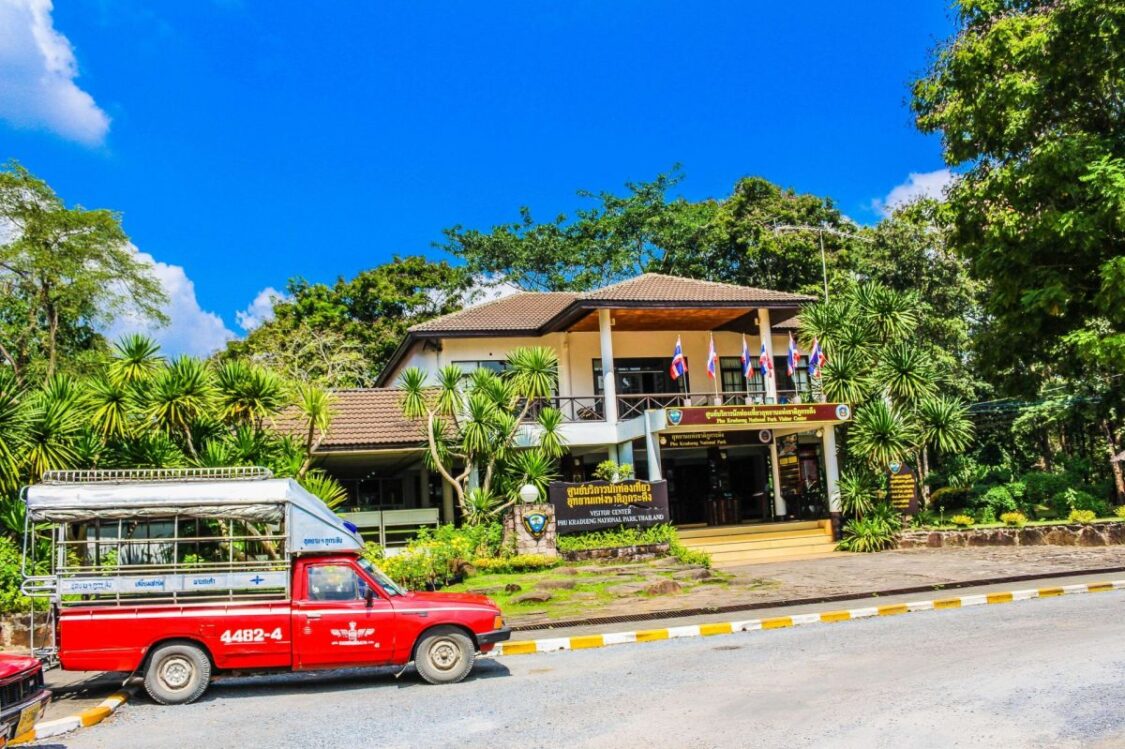
5. Long-Term Orientation in Action
The long-term orientation inherent in the Sufficiency Economy philosophy is illustrated in Thailand’s promotion of sustainable forest management and its reforestation efforts.
Thailand’s forests have faced significant challenges over the years, including deforestation, illegal logging, and habitat degradation. Recognizing the importance of forests for ecological stability, biodiversity conservation, and long-term sustainability, the principles of Sufficiency Economy have guided efforts to protect and restore forest ecosystems.
Community forestry programs have empowered local residents to manage forest resources sustainably, practice agroforestry, and engage in non-timber forest product harvesting. By involving communities in decision-making and resource management, Sufficiency Economy initiatives have fostered a sense of ownership, responsibility, and long-term commitment to forest conservation.
Additionally, policies such as the National Forestry Development Master Plan have provided strategic guidance and financial support for forest restoration and conservation initiatives. By enshrining sustainability principles into law and policy, Thailand ensures that forest conservation efforts are sustained and institutionalized over the long term.
One specific example of Thailand’s successful implementation of sustainable forest management under Sufficiency Economy principles is the Phu Kradueng National Park in Loei province. Phu Kradueng is renowned for its biodiversity, scenic beauty, and cultural significance. Over the years, the park has faced threats from deforestation, encroachment, and unsustainable tourism practices.
In response, the Thai government, with support from local communities and conservation organizations, has successfully implemented measures to protect and rehabilitate the park’s ecosystems.
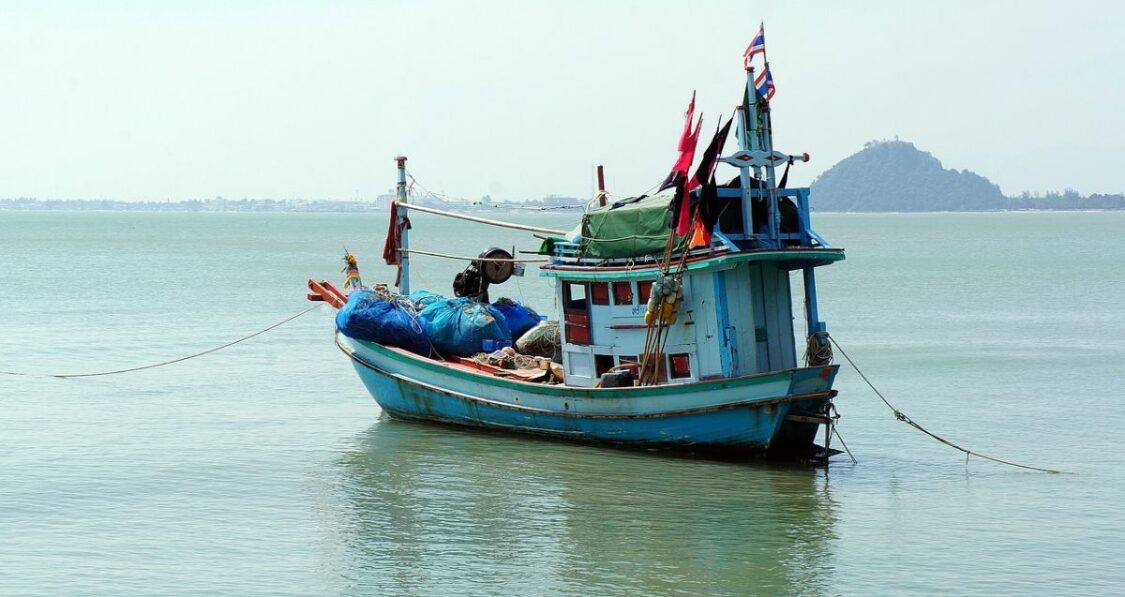
6. Ethical Framework in Action
An example of how a Sufficiency Economy incorporates an ethical framework into economic practices can be seen in Thailand’s response to problems in the fishing industry.
Thailand’s fishing industry, like many around the world, faced significant challenges due to overfishing, illegal fishing practices, and environmental degradation. In response to these challenges, the Thai government, influenced by the principles of a Sufficiency Economy, implemented reforms aimed at fostering ethical behavior, environmental stewardship, and social responsibility within the fishing sector.
For example, the Thai government implemented regulations such as fishing quotas, seasonal closures, and marine protected areas to promote sustainable harvesting practices and prevent the depletion of fish stocks.
The government also introduced reforms to combat illegal, unreported, and unregulated (IUU) fishing, which often involves exploitation of workers and human rights abuses. By cracking down on IUU fishing and promoting ethical labor standards, Thailand has worked to create a more socially responsible and equitable fishing industry.
One specific Thai initiative that has promoted ethical and sustainable fisheries management is the establishment of Fisheries Improvement Projects (FIPs) for key seafood products. FIPs bring together stakeholders along the seafood supply chain, including fishers, processors, retailers, and NGOs, to address sustainability issues through collaborative action plans. These projects focus on improving fishing practices, reducing environmental impacts, and enhancing social responsibility within the fishing industry.
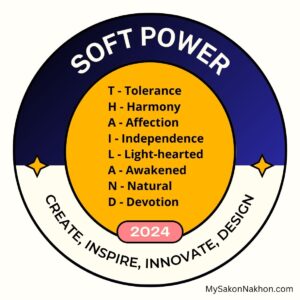
Thailand’s Next Steps
This should put to bed the criticisms regarding Thailand’s Sufficiency Economy philosophy and the manner in which a country can effectively apply its principles. There are a multitude of ways Sufficiency principles can be applied, but such applications take time, patience, and wisdom to implement. Big ideas are always a work in progress, and we all have a part to play.
The education sector in Thailand, for example, is one area where the Sufficiency Economy philosophy could be applied to a much greater degree and skill. They’ve been a driver of my own work here in the Kingdom as a university educator for over 20 years, inspiring me to write a recent essay on Thailand Education Reform that de-emphasizes English and concentrates more on the Thai language and its regional dialects, an essay on Thailand Soft Power and how to use the MySakonNakhon.com website as a template for provincial education projects, as well as proposal for a Rajabhat University Sufficiency Economy program.
- Monogamy and the Mia Noi in Thailand - April 27, 2024
- How to Greet a Monk in Thailand – Saying Hello - April 22, 2024
- The Hottest Place in Thailand – Record High Temperature - April 22, 2024
